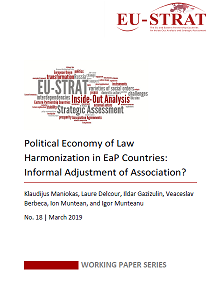Title: Political Economy of Law Harmonization in EaP Countries: Informal Adjustment of Association?
Authors: Klaudijus Maniokas, Laure Delcour, Ildar Gazizulin, Veaceslav Berbeca, Ion Muntean, and Igor Munteanu
Abstract:
In our paper, we look at the conditions for successful transfer of European Union (EU) rules in the areas of transport, environment and energy to the associated Eastern Partnership countries. We assume that in these areas there are fewer indirect external benefits of implementing EU rules than in the areas of trade and visa free regime and therefore the adoption of these rules should depend more on their direct relevance to the governments of associated countries. Our review of law harmonization in all three countries is complemented by three in-depth case studies in all three areas. These offer an analysis of how EU standards and templates travel to this neighbourhood by delving into their adoption and implementation and assessing the degree to which they fit with governmental priorities. The first case study considers transport and focuses on the implementation of the road safety directive (2009/40/EC) in just one country, Georgia, where implementation proved challenging. The second case study concerns Ukraine and Moldova, focusing on the role of environmental impact assessment regulations in discussions between the two countries on the possible construction of hydropower plants on the Dniester River. In the area of energy, the third case study focuses on unbundling in the electricity sector in all three associated countries. Our main finding is that transposition and implementation in these areas is patchy, but better than expected. This is due to the on-going informal adjustment of the Association Agreements, which has reduced the scope of the commitments taken. While this informal adjustment helps to lighten the burden of law harmonization and facilitate transfer of the EU acquis, it does not seem to follow any blueprint, and thus creates uncertainty among the different stakeholders over future regulation.

